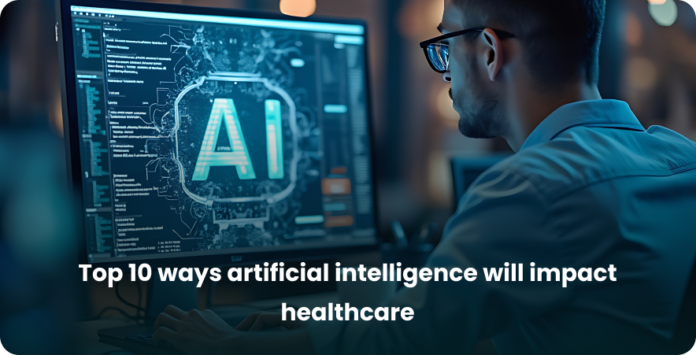AI technology is making a big move in the healthcare industry. It produces custom solutions that improve efficiency and accessibility.
Through AI development services, healthcare institutions can tackle complicated, redundant tasks with vast volumes of data. AI shows new and better potential throuCurrent applications of AI show new and improved potential. They enhance medical diagnosis and results.lead
Top 10 key impacts of AI in healthcare
AI technology improves healthcare by –
1. Medical Imaging
The primary revolution in healthcare AI applications happens through medical image analysis. An AI development company helps labs produce huge datasets from scans and imaging. Earlier, radiologists used to examine X-rays, CT scans, and MRIs closely but still missed some minor findings.
Fortunately, these AI systems detect even hard-to-find anomalies quickly. AI models like Google’s DeepMind are giving exceptionally great results in detecting breast cancer and eye diseases. All this leads to prompt treatment. Through AI, radiologists saw improved analysis in less time, which led to quick and improved patient care.
2. Hospital Management
An AI development company improves hospital management by controlling patient admissions and resource distribution. During rush time, it becomes very difficult to manage patients, which leads to the exhaustion of both staff and patients.
AI uses predictive analysis to see if there are any seasonal diseases and other changes that affect the effective distribution of personnel. Another good part here is AI chatbots that improve scheduling by answering patients 24/7. This reduces admin load, making things go smoothly.
3. Drug Discovery
Earlier drug discovery was a time-consuming and expensive process. A healthcare development company in the USA has eased down this by identifying potential drug candidates. Data analysis from ML algorithms checks a vast volume of datasets to find compound matches.
This minimizes the experiments that are involved in drug discovery. Atomic and Benevolent AI have developed AI systems for fast treatment of Alzheimer’s disease and rare cancers. With AI, drug discovery has enabled deeper investigation into complex diseases.
4. Nutrition Recommendations
AI systems can create custom diet plans according to the health requirements of different individuals. Genetics, health history, and lifestyle vary from person to person, and it analyzes everything to give recommendations.
Diabetics and heart patients experience health improvements through these customized suggestions. With apps like Neutrino and Foodvisor, users can get insights into their dietary decisions and adopt healthy changes. With all this, individuals take better charge of their health and protect themselves from diseases.
5. Clinical Decision Support
Advanced AI decision-support tools help doctors consider better treatment plans. These tools go deeply into patient health data, medical history, and more recent findings. They use diagnosis reports and medication doses to make the decision. A prominent healthcare development company, IBM Watson Health, uses AI to process clinical data and generate important insights.
6. Virtual Health Assistants
Virtual AI health assistants make a positive change to patient health with assistive technologies. They offer round-the-clock guidance alongside prescription alerts and health monitor support. Accessible via mobile applications and voice-control devices, these technologies help patients get inexpensive access to basic health information.
Through their AI technologies, Ada Health and Babylon allow patients to access their symptoms. Additionally, it handles tasks that require too much human effort, making time for operations that matter.
7. Robotic Surgery
Healthcare organizations employ robotic surgery to carry out even the most complex surgeries. All this is done with the guidance of a human surgeon. It is completely safe, minimizes surgical intrusion, and accelerates patient recovery processes.
Healthcare robots maintain precision through real-time imaging combined with data analysis, which allows them to guide surgical instruments toward objectives beyond standard human capabilities. Primitive robotic systems reduced scarring, diminished postoperative discomfort, and accelerated recovery duration for patients alongside surgeon benefits, including total system control and mastery of complicated medical applications.
8. Automated Administrative Tasks
The AI application automates a lot of tasks, allowing the admin department to dedicate more time to improving overall efficiency. AI solutions perform repetitive operations that prolong healthcare operations, including insurance claim handling and medical record administration. The utilization of natural language processing (NLP) systems transforms clinical note transcription while providing summaries, which allows doctors to save time and achieve better documentation results.
AI scheduling programs, together with automated chatbot systems, maintain medical appointments as they also diminish record storage backlogs. Through its ability to ease administrative overhead, AI simultaneously drives productivity improvement and elevates the job satisfaction levels of healthcare workers.
9. Clinical Trials
The participant recruitment process for clinical trials creates long delays and challenges throughout research and development periods. AI development services are effective in quickly identifying suitable candidates based on data, genetic information, and demographic details.
With this, they efficiently recommend trials that are suitable for specific participants. Accelerated clinical research operations with improved participant diversity enable scientists to find more dependable results. This enables better trial efficiency for suggesting new treatment plans that can make a difference.
10. Automated Pathology Analysis
Pathology depends on diagnostics, yet certain labor-driven procedures are prone to human errors. Pathology is undergoing rapid change, and AI tools and technologies make it even more advanced. It can even analyze tissue samples to search for disease patterns.
It further performs a cellular-level examination of slides to find irregularities rigorously. The PathAI-developed AI system is successful at detecting even cancer cells using histopathology.
Conclusion
The healthcare industry sector is getting advanced through AI technology. It also lowers management costs and raises operational performance. Medical imaging, robotic surgery, drug discovery, and diet plans are making a positive change.
Data security and ethical concerns are obvious, but AI usage with the right strategy can make a difference. Hire AI developers as they can guarantee increased accessibility and higher accuracy. AI development services in healthcare promote better well-being and healthier communities.

Author Bio: Bhoomi is an IT expert and a writer by passion. She specializes in helping business in different industries grow their online presence with her content creation and marketing strategies. When not writing for AI in Healthcare, she enjoys cooking yummy dishes for her family and team!

